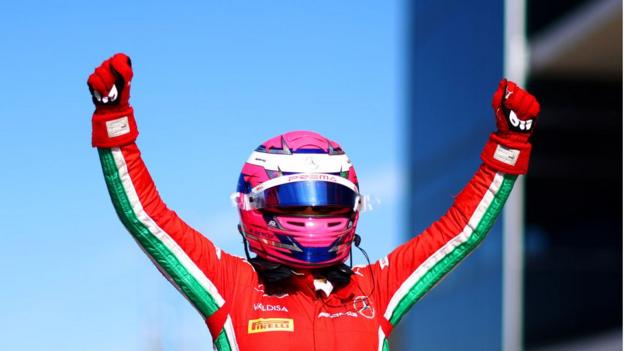
Spain’s Marta Garcia became the inaugural Formula 1 Academy champion with victory in the first of three races at the US Grand Prix.
The 23-year-old was congratulated after the race by seven-time F1 world champion Lewis Hamilton, who told her she “deserved” her success.
Garcia’s win put her beyond reach of rivals Lena Buhler and Hamda Al Qubaisi in the female-only feeder series.
One more race in Austin this weekend concludes the series’ maiden season.
Saturday’s second race was won by Al Qubaisi.
The F1 Academy, established this year, is the latest attempt to increase female participation in motorsport with the long-term aim of getting women to the highest level of the sport.
Italian Lella Lombardi was the last woman to race and score points in F1. She scored half a point for finishing sixth in the 1975 Spanish Grand Prix.
F1 Academy managing director Susie Wolff said at the US Grand Prix that it was crucial the series succeeded in the coming years if motorsport was to increase competitor gender diversity.
“I am very conscious of this not being a flash in the pan and then it dies away,” Wolff said. “That would be a huge regret because if that happens there is no chance for wider diversity in this sport. If this doesn’t work, nothing is going to work.”
Wolff said that F1 Academy needed to be more than just another racing series.
“Fifteen cars driving doesn’t fix the problem,” said. “There’s just simply not enough participation for F1 Academy to exist if it’s just a series.
“I don’t believe in segregation, but I do believe that the concept of F1 Academy it will be the rocket fuel to progression for these young drivers.”
“With the momentum that we are giving them, the exposure we’re giving them, I hope that will make it easier to go out and raise the money to further up the sport.”
Plans to help the leading drivers in this year’s championship progress to the next level on the ladder to F1 will be unveiled in the coming days.
Wolff would not reveal what they were, but said: “We are not just going to make sure that our winner progresses, I want my winner to progress with the best chance of success.”
Wolff said that she was already seeing progress as a result of the exposure F1 Academy and its various recruitment programmes were giving to the concept of women becoming racing drivers.
She said a new programme at karting tracks in the UK this year had “seen an increase from 2.5% to 9% – went from 18 girls to 65 girls – trying to qualify for the British indoor karting championship”.
The programme, called Next Generation, started this year at just six tracks but will be expanded across the country and beyond next year.
The 10 F1 teams will all sponsor a driver in the Academy next year and drive cars painted in the colours of that team.
Wolff said: “They’ve all taken a leap of faith to join us on this on this mission and we need to make sure that we’re delivering a strong package.
“One team principal in particular said to me: ‘You are just putting a plaster on the problem. Are you actually going to try and fix the problem?’
“I said: ‘Yes, we’re not here as a flashy series that is trying to gain exposure and give 15 young drivers the lime light. Because I’ve been there. I know how tough it is and I know how few women are participating in all the different levels.
“So we need to figure out how we’re going to change long term and that comes down to increasing that talent pool and that comes on to making the sport more accessible and inspiring the next generation to enter the sport.
“We’re going to show this huge global fanbase of Formula 1, that this sport actually wants to become more diverse. The sport wants to give opportunities to women and if I think of a 19-year-old girl zipping up the Ferrari race suit next year, that’s a powerful image that I can’t quantify in numbers.
“By the end of 2025 after two seasons of my vision of what F1 Academy, we will be able to have a very clear idea whether this is moving in the right direction or not.”